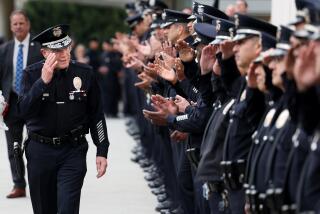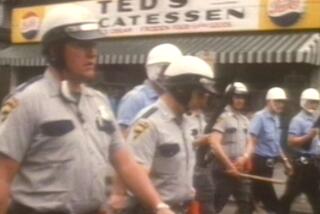Chief Turns Film Critic
- Share via
The speaker who followed Sunday’s screening of the movie “Fury” was neither film historian nor movie star. But as chief of the Los Angeles Police Department, William J. Bratton had a few insights to share with the high school audience that had come for a special program devoted to ethics and film.
“Fury,” directed in 1936 by Fritz Lang, is a movie about an attempted lynching by a small-town mob. Instead of dissecting the cinematography or lighting, the cop-turned-critic noted that the victim in the film was not read his Miranda rights. And he made a connection with the LAPD’s Rampart scandal, noting that some LAPD officers “began to lower constitutional thresholds,” much like the mob in the movie.
But he also hinted at some larger themes. Though the film stressed the importance of the rule of law, Bratton noted the civil disobedience of Mohandas K. Gandhi and Martin Luther King Jr., and asked the students to consider if unlawful activity was ever morally justified.
“There are always areas of gray,” he said. “It’s never black and white.”
Bratton and his wife, TV legal commentator Rikki Klieman, were invited to the event at Los Angeles’ Loyola High School by Taube Schwartz, 17, co-founder of the program Students for Teaching Ethical Awareness through Movies, or STEAM.
The idea of the program, Schwartz said, is to use film to spark serious conversations about moral and ethical issues among Los Angeles-area students with the help of adult experts, actors and filmmakers.
In recent years, the program has invited Kirk Douglas to delve into matters of war and obedience in the 1957 film “Paths of Glory.” Martin Landau has tackled themes of good and evil in the 1989 Woody Allen movie “Crimes and Misdemeanors.” More recently, political analyst Susan Estrich lent her expertise to a screening of the 1964 political drama “The Best Man.”
“All the movies deal with a lot of difficult decisions that have got to be made,” Schwartz said. “There’s not always a clear-cut right answer.”
Schwartz is a movie fan, but her main motivation for starting STEAM was her switch from a Jewish school -- where discussions of ethics and morality were commonplace -- to the private, secular Polytechnic School in Pasadena, where the emphasis, she said, is more on academics.
Schwartz gave a copy of “Fury” to Bratton and Klieman after inviting them to the program, and the pair seemed animated by the legal, ethical and practical questions it raised. Klieman, a former prosecutor and defense attorney, used the courtroom scenes in the movie to explain lawyers’ roles in the U.S. justice system.
As the courtroom drama concludes, some of the instigators of the lynching are found guilty after the prosecutor introduces a newsreel that shows their participation. Bratton said the use of film as evidence was novel at the time. He also noted that video footage has been central to a number of LAPD brutality incidents in recent years, from the Rodney King beating to the June 23 flashlight beating of car-theft suspect Stanley Miller.
After the couple’s informal chat, the roughly 25 students huddled in groups to discuss the movie on their own.
More to Read
Only good movies
Get the Indie Focus newsletter, Mark Olsen's weekly guide to the world of cinema.
You may occasionally receive promotional content from the Los Angeles Times.










